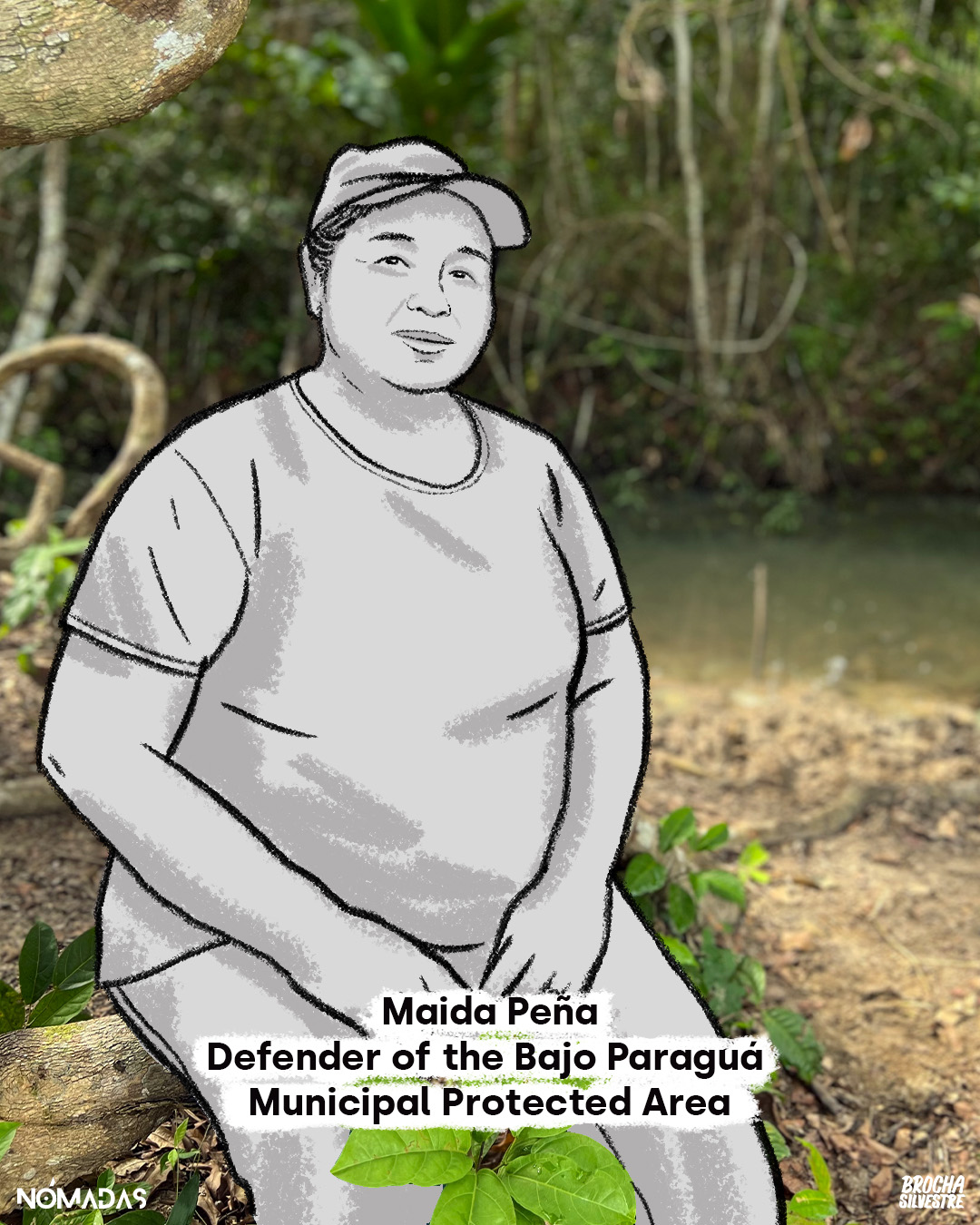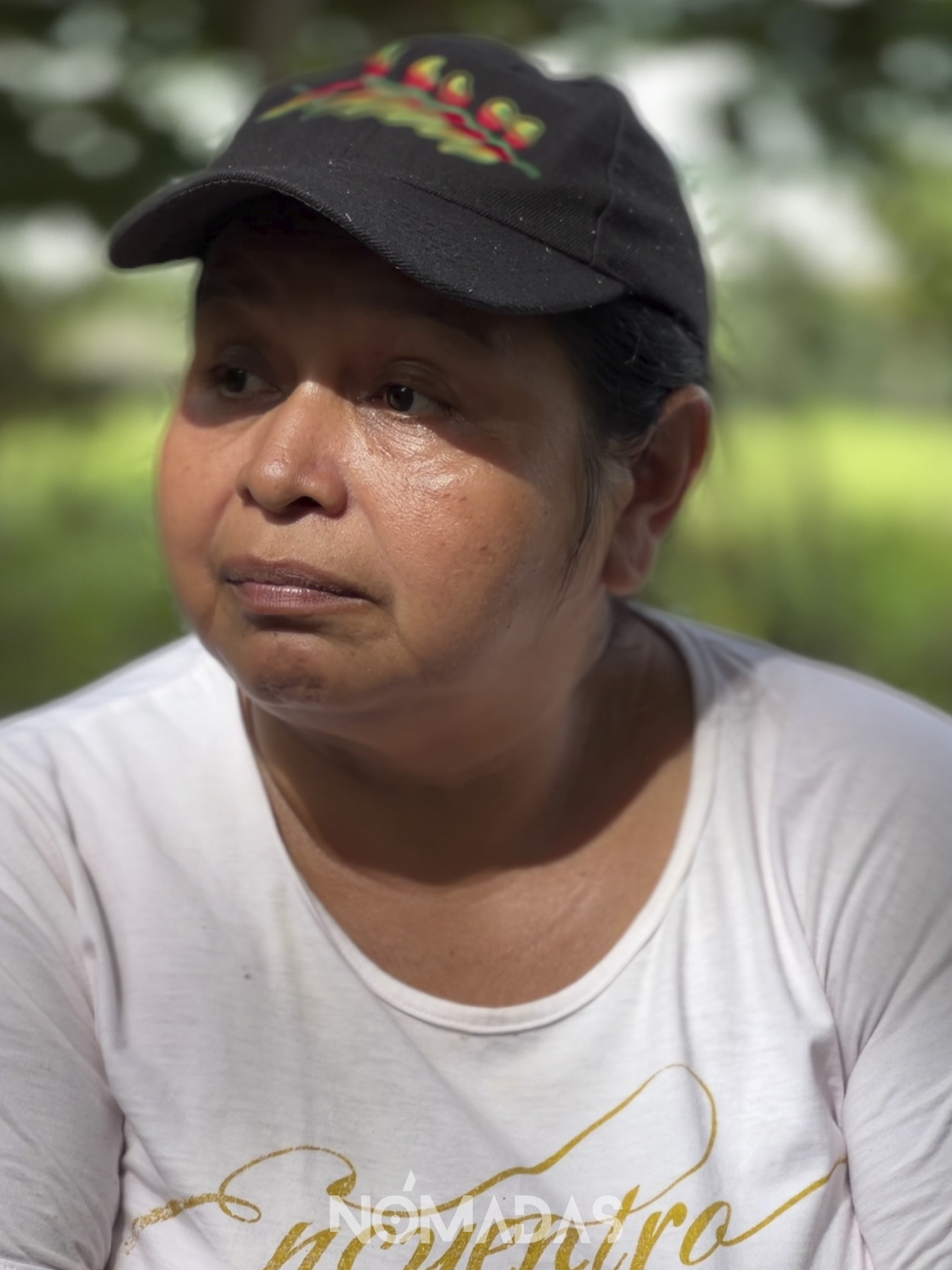ENGLISH


ENGLISH
INTERVIEW
Encroachments, fires, and water scarcity are the harsh realities that the Chiquitano indigenous people from the lowlands of Bolivia face, as settlers and agribusiness advance without consideration. With the looming threat of drug trafficking, being an environmental defender becomes a dangerous challenge that stirs the anger of powerful forces. Maida Peña knows this well.
August 21th, 2023


Roberto Navia Gabriel
Journalist
Maida Peña is sitting on a mound of earth. Very comfortable, leaning against a lush tree, a few meters away from a stream that springs from a neighboring hill of Porvenir, a community that acts as a protector of the Municipal Area of Bajo Paraguá, which in turn shields the Noel Kempff Mercado National Park and the vast Bolivian Amazon.
Here, she often comes to meditate, to ponder over the issues of the forests that sometimes prevent her from sleeping. Maida Peña, with a round face, steady gaze, calm yet powerful voice, begins to speak, raining words that fall onto the forest:
Lowland indigenous people are alone, orphaned, fighting for something that belongs to everyone; it’s no longer just the task of indigenous peoples to fight for biodiversity, for sustaining life, because for us, life is the forests, the grand home.
-How is the situation of indigenous people from the lowlands?
-Indigenous people from the lowlands are alone, orphaned, fighting for something that belongs to all. It is no longer just the task of indigenous peoples to fight for biodiversity, for preserving life. For us, life is the forests, the big house. And in these critical times, many places are devastated. In different parts of the world, forests are flooded and deforested. Now we no longer have these wonders, these forests where the beauty of breathing pure air and living in harmony with nature was felt.
-Where is this loneliness leading you?
-This loneliness is leading many indigenous brothers and sisters to leave the community, to migrate elsewhere, to live with illegality, to feel threatened in our own homes because our markets are the rivers and forests where we used to fish, relax, hunt, gather fruits, and find our sustenance. We were raised with respect for nature, never for commercial purposes, only for the consumption of our families. Now, we feel threatened from all sides.

Maida Peña defends the jungle from Porvenir.
– What are the main problems faced by indigenous communities?
-Land and forest encroachments and wildfires.
– Are land encroachments by settlers as dangerous as deforestation carried out by agribusiness?
-They are equally dangerous because we can see the lack of water in some areas. At this time, our rivers have never been so dry. There is a lack of rainfall, and even when it rains, it is not enough. We lack water, and we are suffering the consequences of entrepreneurs who deforest and of leaders from within Bolivia who arrive and do not respect. Before, we saw deforestation as something far away, but now we are experiencing the consequences.
– Where are settlers and agribusiness operating?
-They are in the Bajo Paraguá (municipality of San Ignacio de Velasco, Santa Cruz Department), and they reach the border with Brazil. If it weren’t for the Noel Kempff Mercado National Park and the protected municipal area of the Tierra Comunitaria de Origen (TCO), we would already be practically surrounded. And this is causing problems like water scarcity.
It is causing many indigenous brothers to leave the community, to migrate elsewhere, to coexist with illegal activities, and to feel threatened in our own home.
– But encroachments are already within the protected area?
-Yes, they are inside. We already have more than 300 hectares encroached upon, and they keep advancing despite the complaints made. They have politicized it, and they don’t care. Unfortunately, we don’t have authorities representing us, defending life, Mother Earth, which is what we defend.
– Are there places where water is already sold?
-Yes, if you don’t have money, you don’t have water. Much of the Chiquitana region no longer has water because the watershed was not protected in time.
– Is drug trafficking another threat?
-Of course, it is another threat. They contaminate and are depleting our rivers.
– Is being an environmental defender a problem? Does it challenge powerful interests?
– It is very complicated, which is why those behind the destruction of the forest are exerting pressure to remove me from the position of committee president using lies. But we will continue the fight nevertheless.
This interview is part of the Special: Bolivia’s Invisible Amazon and its guardians who do not give up, carried out by Revista Nómadas, with the support of the Amazon Rainforest Journalism Fund in partnership with the Pulitzer Center.
STAFF:
DIRECTOR: Roberto Navia. PRODUCTION MANAGER: Karina Segovia. PHOTOGRAPHS: Karina Segovia, Lisa Mirella Corti. SOUND PRODUCTION AND POST-PRODUCTION: Andrés Navia. ILLUSTRATIONS AND INFOGRAPHICS: Brocha Silvestre. SOCIAL MEDIA EDITOR: Lisa Mirella Corti. WEB DESIGN AND DEVELOPMENT: Richard Osinaga. COLLABORATION: Manuel Seoane, Diego Adriázola y Daniel Coimbra.
COPYRIGHT 2023
Te contamos desde el interior de los escenarios de la realidad, iluminados por el faro de la agenda propia, el texto bien labrado y la riqueza poética del audiovisual y de la narrativa sonora, combinaciones perfectas para sentir el corazón del medioambiente y de los anónimos del Planeta.
